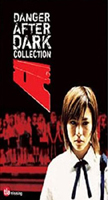 BUY IT AT AMAZON: CLICK HERE!
BUY IT AT AMAZON: CLICK HERE!
STUDIO: TLA Releasing
MSRP: $29.99
RATED: All Unrated
In keeping with the steady offensive on Western pop culture, TLA Releasing has put together three promising Japanese films in one low-priced collection. The gamble here is that these three vastly different movies will all appeal to a potential buyer, or that the buyer’s remorse won’t be strong enough to warrant a return. So, here you go: three engaging films with absolutely no common theme, much as the marketing material would convince you otherwise.

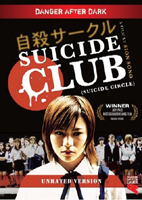 Suicide Club (Suicide Circle)
Suicide Club (Suicide Circle)
RUNNING TIME: 94 min.
SPECIAL FEATURES:
• Image gallery
• Trailers
The Nutshell
Fifty-four young Japanese school girls hold hands and leap in front of a moving train, bathing the station in blood. A dozen junior-high students leap from the roof of their school and splatter on the pavement below. A street vendor swallows a handful of sleeping pills. A mother dices her fingers and bleeds out on a kielbasa. Japan is swept up in a frenzy of self-termination, but who — or what — could be causing it? And what the hell does a preteen girl pop group have to do with it?
The Lowdown
Exaggeration, with its intrinsic satire, is one of the more effective methods of making a social critique. Swift had fun with it in his modest proposal, and much of modern comedy draws on it to lodge bitter needles into the audience along with laughter. Director and writer Sion Sono spins his own gloriously far-fetched scenario in Suicide Club to dig at the youth of his culture and the influences to which they succumb.
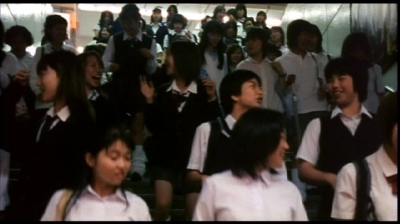
What nerds wish San Diego Comic Con looked like.
The wave of unexplained suicides in this film recalls Kiyoshi Kurosawa’s Pulse (Kairo), but the two take the premise in completely different directions. Where in Pulse the suicides are motivated by a universal despair which guides the plot, in Suicide Club figuring out the cause of the suicides is the plot. Most of the first two acts is devoted to the procedures of one detective Kuroda (Audition‘s Ryo Ishibashi), who is convinced that the suicides deserve a criminal investigation.
That would be a fine an interesting story, except that the investigation is so littered with red herrings and spotty logic that it distances the audience. Instead of feeling actively involved in solving the mystery, you’re left a passive observer, incapable of piecing together the truth behind the suicides because you don’t have all the evidence. These diversions in the case don’t contribute anything in the way of plot, and are only minor additions to mood and context.
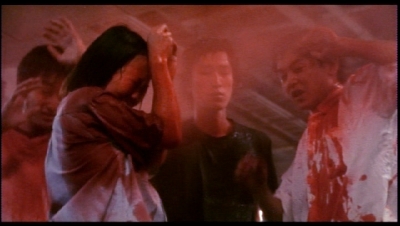
CliffyB says that "gibs" is pronouced like "jibs".
The path to the finale is awfully fucking bizarre and deserves more than summary in a brief capsule of a review. I will say that it involves coded messages in pop music, a bowling alley converted into a sadistic pleasure palace, a glammed up pretty-boy singing about how the dead shine all night long, and a cabal of six year-olds. The absolute strangeness of the conclusion turns the concept of a mystery on its end and makes the whole film a puzzle as the audience tries to work out what the hell just happened.
I admire that kind of filmmaking, but Suicide Club falls short because too much of its important information is given in lengthy, convoluted exposition. There are few visual metaphors to ground the philosophy, and fewer reference points for the audience to assemble its narrative from. The reward of puzzles is in their assembly, and, unfortunately, Suicide Club is missing a few of its pieces.

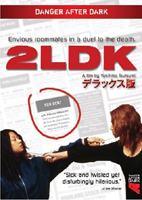 2LDK
2LDK
RUNNING TIME: 70 min.
SPECIAL FEATURES:
• Press conference coverage
• Trailers
The Nutshell
Two actresses, both alike in dignity. One’s a slut, the other’s a mama’s girl, and both are vying for the same role in an upcoming gangster flick. Tensions mount during the night before the agency calls with the news of who will win the part. What starts as a simple conflict over borrowed shampoo quickly escalates to an all-out catfight that would put a lioness to shame.
The Lowdown
Hard to get much more of a simple premise than that. Director Yukihiko Tsutsumi does the wise thing and keeps it exactly as small as it sounds like it should be. A cast of two (plus some voices on a telephone), a single set, and a single plot. If you wanted to be philosophical, you could say that 2LDK is a sort of microcosm, a reductionist story about broader conflicts; but this is one of those times when directorial intent is important, I think. The film is nothing more than it claims to be: a duel to the death.
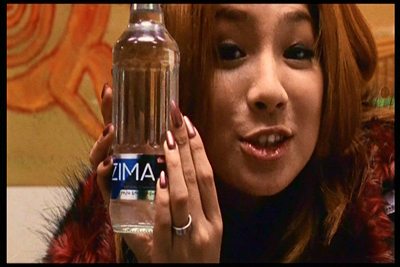
Super Happy Hard Gay Drink It!
The characters set up a cheap conflict. The slutty girl is sure she’s going to get the part, and she generally disregards her roommate’s feelings and property. The theater geek girl from a small town tries to draw a line between herself and her roommate, to keep everything sane as long as both respect the rules. To assist in setting up the conflict, the first forty minutes are shot through with voice-overs of the girls’ thoughts, which are mostly unspoken insults toward each other.
Don’t get the wrong idea, though: these insights into the girls’ psyches contribute absolutely nothing toward character development. Character isn’t at all important in 2LDK, except in that it represents the disparity between the girls that leads to conflict. All traces of character are dispensed with when the violence starts, and any sympathy you had toward miss theater geek is handily revoked when she fires the first volley. Any glimpses of character that occur during the lengthy duel are intentionally misleading as the girls try out their acting skills to manipulate each other.
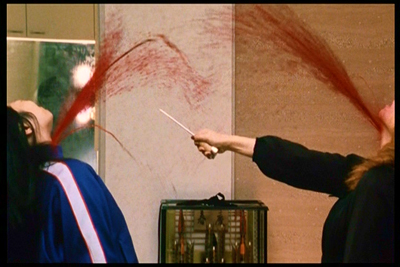
All right, Shylock: here’s your answer.
The duel is the meat of the film. It takes a bit too long to explode, but once it does the action is well-shot, creative, and brutal. All manner of weapons are employed: a padded bra, pressure points, chainsaws, allergies to straw, katana, wakizashi, fire extinguishers (though not in the method employed in Irreversible); anything and everything lying around a simple apartment becomes a weapon.
As a diversion, 2LDK lives up to its promise of an exaggerated duel. There’s not much to distinguish it from a grudge match you’d see on pay-per-view, though. You get the backstory to set up a simple, memorable conflict, and then you get a prolonged fight. It’s well-done for what it is, but it isn’t much.

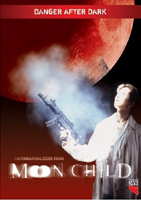 Moon Child
Moon Child
RUNNING TIME: 119 min.
SPECIAL FEATURES:
• Photo gallery
• Trailers
The Nutshell
Young thugs in near-future Japan try to carve out their own piece of the underworld action. Thing is, they’ve got a bit of an advantage on their side: one of their members, Kei (HYDE), is a vampire. Teen sensation Gackt plays protagonist Sho, who, for some reason, assumes control of their little gang. Backstabbing, backbiting (literally), and Godfather-pastiches abound as mopey bishii meld the World of Darkness with gangland action.
The Lowdown
Okay, there’s no question that Moon Child is a flawed movie. It comes from a former adult film director who has no sense of pacing or tension. It features two pop stars in the lead roles. It wastes its futuristic setting by forgetting about it.
The way I usually critique a film is to start the viewing with the film scoring a perfect ten, and ding it points for every problem. For this film, I’d rather go the other direction. Assume it’s a zero, and then I’ll add on bits and pieces that contribute to its (arguable) success.
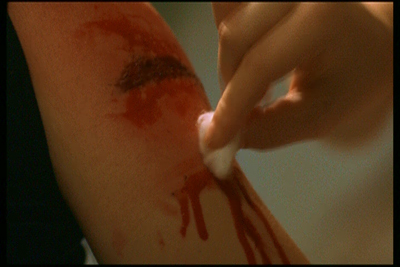
Nice try, Helen Keller, but you’re no Florence Nightengale.
First log on the house is that the action is well-directed and fun to watch, special-effects notwithstanding. There are a number of gunplay sequences, and they’re varied enough so as not to get boring. Those occurring in the first half are laden with a good mixture of situational and character humor, while those in the second half are sufficiently cathartic.
The mess of characters coalesce in their relationships and motivations about forty-five minutes in. It takes a while for director Takahisa Zeze to get them all to a place where they connect with the audience, but once that connection is found it doesn’t get abandoned.
The actors on the "good guys" side have a wonderful interplay, and all possess an easy charisma (with a couple of exceptions who die quickly and aren’t too important.) Putting them all to shame, though, is Zeny Kwok as sister/love-interest Yi-Che, a mute artist who radiates her emotions like her co-stars try to project sex appeal. Her singular performances contributes incredibly to the mood of whatever scene she happens to be in. She’s underused, and discarded too easily, but while she’s around, she’s a vision.

I am following my fish.
The story about vampires is almost entirely unimportant to the plot, after about the first half-hour. The yakuza story dominates everything else, and it’s far too derivative for its own good. It stretches for an operatic tone, and lands somewhere around sentimental, and a bit too false.
Adding up points for performances, action directing, and what emotional resonance it salvages, Moon Child arrives somewhere just a bit south of average.

The Packages
In all cases, the discs are very stingy with the bonus features. 2LDK has a brief segment from a press conference regarding the "Duel Project," which director Yukihiko Tsutsumi is a part of. The other two discs just have photo galleries.
None of the transfers are particularly great, though that seems to be one of the selling points for the set. Suicide Club gets the best deal out of the three, but none of them are particularly attractive, featuring artifacting in the dark color areas.
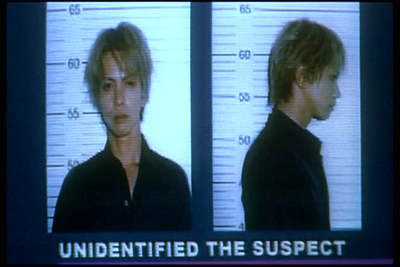
Fired The Translator
The Super Lowdown
So, they’re nothing alike. All three of these things are not like the other. Want a mind bender? Try Suicide Club. Want a bit of the old ultra-violence? 2LDK is for you. How about a soap opera with vampires? Moon Child is your baby. Thing is, all of these discs can be purchased separately, at a price that’s cheaper than most commercial releases.
2LDK: 6.1 out of 10
Moon Child: 4.9 out of 10

Danger After Dark Collection: 6 out of 10